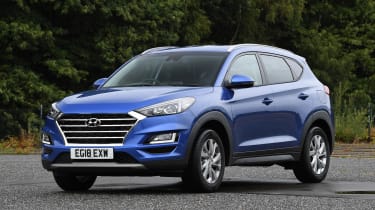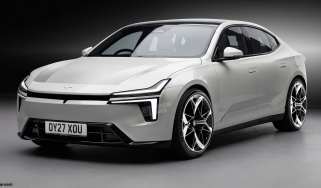Hyundai Tucson (2015-2020) review - MPG, CO2 and running costs
A revised engine range means the Tucson is cheaper to run than ever, but the high-CO2 petrol models are best avoided

Prices for the Tucson range start at around £22,000 and rise to around £35,000, but at least they don't break the £40,000 mark, so all models cost £140 a year in road tax. And you won't deviate very far from the list prices by adding options, because the only option offered is metallic paint at around £650.
The Tucson engine range is designed to offer competitive running costs, and the 2018 update saw the older 1.7 CRDi diesel replaced by a smaller 1.6 CRDi that offers the same performance but with improved efficiency. However, it's not possible to compare these engines like-for-like, because the new engines have been tested to WLTP legislation, which offers poorer economy results in test conditions, but produces results that are more likely to be achievable in the real world.
The introduction of the mild hybrid systems has improved efficiency in the 1.6 diesel models. The 134bhp engine achieves 48.7mpg (manual) and 52.3mpg (auto) on the WLTP test cycle, with CO2 emissions of 151g/km and 141g/km, respectively.
At the top of the range, the 2.0 CRDi has claimed economy of 42.8mpg, although the way the mild-hybrid system works means it doesn't do much to boost the engine's WLTP test economy. Emissions are rated at 172g/km.
All diesel Hyundai Tucsons use AdBlue to help reduce emissions, and there's a 14-litre AdBlue tank that will need topping up on occasion as and when the Tucson's trip computer lets you know it needs doing.
Petrol models have fuel economy ranging from 34.9mpg to 37.2mpg, and surprisingly the engine that's the most efficient is the more powerful 175bhp 1.6 T-GDi with the seven-speed DCT auto. This means it also has the best emissions, at 173g/km.
Depreciation
Prices start from around £23,000 and rise to nearly £36,000 for the top of the range Tucson models. Over the course of three years and 60,000 miles, the Tucson will retain around 38-43% of its original value. That’s competitive for the class, meaning the Tucson will hold slightly more of its value when you come to sell than rivals like the Nissan Qashqai.
Insurance groups
Comparable in price to its rivals, the Tucson also boasts relatively low insurance groups that start from group 13 for an S Connect model or SE Nav with the 1.6 GDi petrol or 1.6 CRDi diesel, and rise to group 25. This should help keep premiums lower than you’d get in most mainstream rivals.





